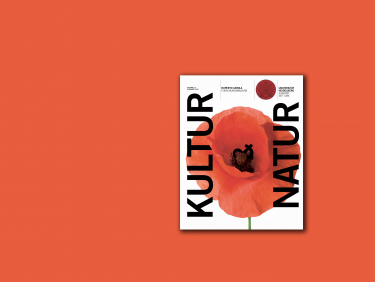
CULTURE & NATURE
DEAR READERS OF RUPERTO CAROLA,
Nature and culture – or nature and humankind – are not opposites. From the standpoint of the geosciences, they both belong to “System Earth”, a view that is reflected by the current discussion about the “Anthropocene” as a new geological era. But many of us are also shaped by the teachings of Judaism, Christianity and Islam, which emphasise the significance of humans and the special role they play in the scheme of things. This gives rise to a dualism that occasionally shifts into opposing stances: nature and culture – a contradiction in terms or just two sides of the same coin?
Are we humans and our actions part of the system, are our “cultural achievements” dictated by nature? This Darwinist concept was espoused, for instance, by the geographer and economist Ellsworth Huntington before the First World War. With the rising influence of the social sciences in the 20th century, it was countered by the theory that human beings, and therefore cultural development, are governed solely by human will, by humankind’s independent mental-social abilities and its creative drive. Then, a few decades ago, another idea became established that can be traced back to interdisciplinary projects and cross-disciplinary discourse. This idea holds that while humans and nature are two halves of a whole – a concept that is quite familiar to many nature religions – humans as sociocultural beings do have some creative leeway within the scope of the natural possibilities, especially in their choice of means. This neo-deterministic world view seems to gain an increasing following today.
More and more, it is becoming clear that, in view of the complexity of “System Earth” – which includes humans as an integral part –, a monodisciplinary research approach can at best provide a narrow breadth of knowledge that may help solve isolated problems. Complex challenges, on the other hand, require multidisciplinary cooperation, if only because such cooperation allow us to classify and correctly evaluate the findings of the various subject disciplines. Reality is nothing if not complex – a fact that is reflected in our latest journal entitled CULTURE & NATURE. The 15th edition of RUPERTO CAROLA accepts this challenge without claiming to have an answer to every question. But encouraging readers to think about certain issues, to look at them from different angles and perhaps find counter-arguments to the popular, simple answers put forward by various interest groups – that is a realistic objective for our authors, who approach this task from the perspective of the life and social sciences, humanities, economics and the law. This process requires an open mind, including the ability to not blindly adopt pre-selected and pre-fabricated ideas; such openness of thought and reflection is embodied by our University’s motto “Semper Apertus”. With this in mind, I wish you an inspiring and rewarding reading experience.
Prof. Dr Dr h.c. Bernhard Eitel
Rector of Heidelberg University

- Interview with Eva Winkler and Kurt Roth: Adjusting course. Nature and/versus culture
- Thomas Meier: Against the segmentation of the world. Solutions for the world of tomorrow
- Olaf Bubenzer, Hans Gebhardt, Frank Keppler: Humans as a geological force. The Anthropocene
- Florian Diekert: Tipping point. Coordination and cooperation

- Jörg Pross und Oliver Friedrich: The book of earth history. Revelations from the bottom of the sea
- Nicole Aeschbach and Kathrin Leutz: Acting together. The great transformation
- Anja Senz: No breath of fresh air. China in environmental distress
- Christiane Brosius: After the catastrophe. Why cultural heritage must be documented

- Michael Boutros: Genetic scissors. Precision cuts in our DNA
- Johannes Schemmel: Modelled on nature. How machines learn to learn
- Johannes Walcher: Approximation. Dualities in mathematics and physics
- Kerstin Göpfrich, Ilia Platzman and Joachim Spatz: The building blocks of molecular engineers. On the way to the synthetic cell

- Polly Lohmann: Defenceless. Culture and nature in Pompeii
- Martin Borowski: Law, justice and morality. The debate on natural law and legal positivism
- Ernst Pernicka: Information of the Bronze Age. The forensics of archeology.
- Sarina Tschachtli: The wilderness in and between us. Incest in medieval literature




